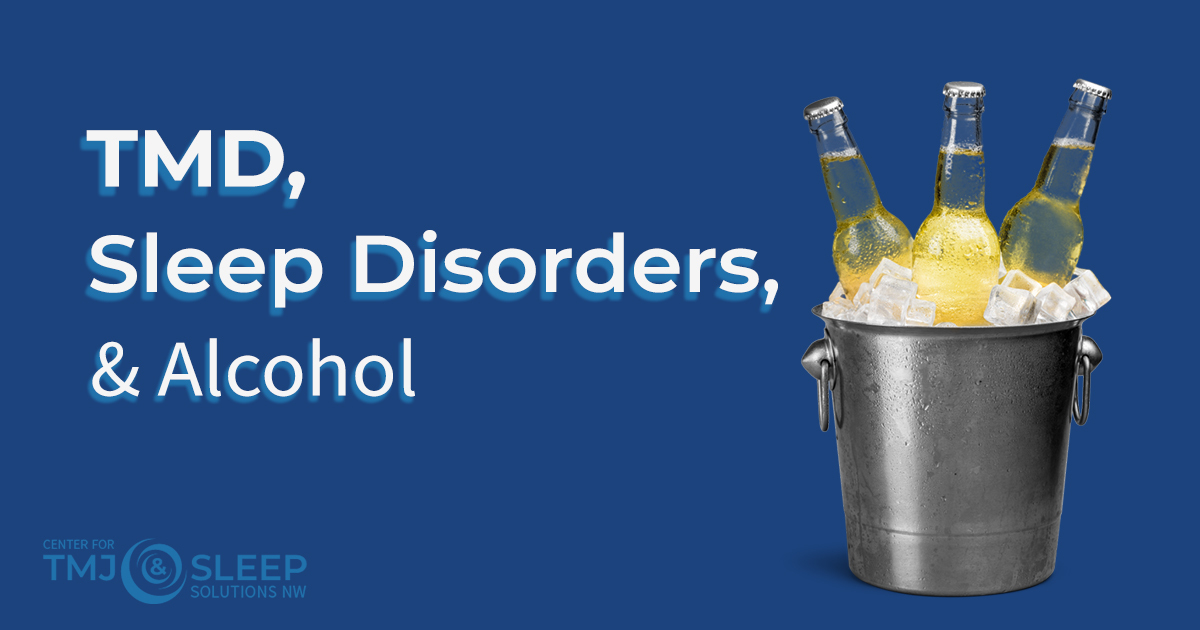
Alcohol & Sleep: What You Should Know If You Have TMD Or Sleep Apnea
Do you like to unwind at night with a cocktail or two? Is Friday happy hour with your friends or colleagues a regular occurrence? Does your social life include activities where alcohol is a given? Consuming alcohol, especially in the evenings, does not promote restful sleep, and people dealing with temporomandibular disorder (TMD) or sleep apnea need to be aware of the potential effects this can have on their health. If you have either of these conditions and enjoy an alcoholic drink or two in the evenings, even occasionally, please keep reading to learn valuable information that will help you get better sleep.
TMD, Sleep Disorders, and Alcohol
People who struggle with TMD or a sleep disorder, like obstructive sleep apnea, regularly experience poor sleep quality that can worsen based on external factors, including alcohol consumption. Understanding how alcohol affects sleep in general and how that relates to your TMD or sleep disorder is essential to the success of your treatment.
The Impact of Alcohol on Sleep
Many people believe that having a cocktail, a beer, or a glass of wine at night helps them relax and fall asleep, which is only partially correct. Initially, alcohol does have a sedative effect, helping you fall asleep. As the body metabolizes alcohol, however, it can disrupt the normal sleep cycle and contribute to sleep disturbances.
Alcohol interferes with the various stages of sleep, including rapid eye movement (REM) sleep, which is crucial for cognitive function and emotional well-being. This disruption can lead to restlessness and less restorative sleep, worsening the sleep-related challenges people with TMD and sleep apnea face.
Alcohol and Insomnia
Alcohol has been shown to contribute to insomnia, which is especially problematic if you have TMD or sleep apnea and already struggle with sleep. As the initial sedative effects wear off, you may experience increased wakefulness during the second half of the night, further compromising the overall quality of your sleep.
Alcohol and Sleep Apnea
You may notice that you snore louder than usual after a night of drinking. Alcohol relaxes the throat muscles, increasing the possibility of airway obstruction and the frequency and severity of sleep apnea episodes. This can result in more disruptions in breathing, leading to fragmented and less restful sleep.
Alcohol and TMD
People with TMD often clench their jaw or grind their teeth at night. Because alcohol is a muscle relaxant, it can increase jaw clenching, potentially disrupting sleep and causing more intense jaw pain and headaches upon waking. Additionally, the restlessness you experience at night increases daytime tiredness and puts additional stress on your body, which can manifest as tension in your TMJ and jaw muscles.
Recommendations
Considering the negative impact of alcohol on sleep, especially if you have TMD or sleep apnea, we recommend consuming alcohol with caution. Here are some tips to help prevent potential problems:
- Listen to Your Body: Pay attention to how your body responds to alcohol. You may find that even a small amount of alcohol negatively affects your sleep.
- Moderation is Key: If you choose to drink, be careful not to overdo it. Limiting the amount of alcohol you consume and spacing out drinks will minimize its disruptive effects on sleep.
- Create a Sleep-Friendly Environment: Establishing an environment that is conducive to sleep is essential if you have TMD or sleep apnea. This includes maintaining a consistent sleep schedule, creating a comfortable sleep area, and avoiding stimulants or depressants (like alcohol) too close to bedtime.
- Talk to Your TMD or Sleep Specialist: We are here to help you identify triggers in your life that may be contributing to your TMD or sleep symptoms and manage your condition around them.
If you have any questions or experience complications with your sleep disorder or TMD, please reach out. To schedule an appointment, contact one of our offices, which are located in Silverdale, Lynnwood, Bellevue, and Federal Way, WA. We look forward to seeing you soon!










